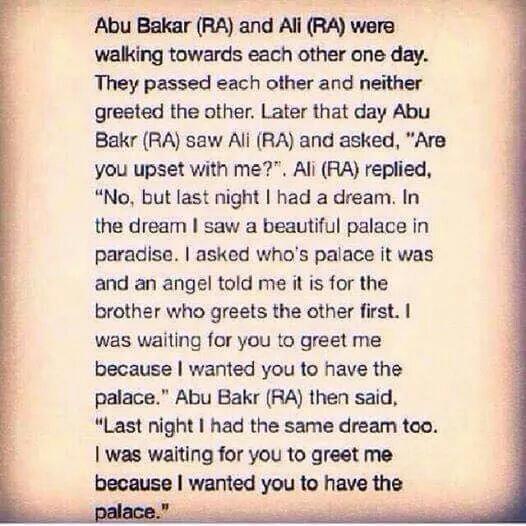You are using an out of date browser. It may not display this or other websites correctly.
You should upgrade or use an alternative browser.
You should upgrade or use an alternative browser.
MaShaAllah! Beautiful Islam Words/quotes.
- Thread starter queenislam
- Start date
Abu Juwairiya
Junior Member
Abu Juwairiya
Junior Member
Abu Juwairiya
Junior Member
The last ten nights of Ramaḍān are better than the twenty before them combined, let alone other nights [of the year]. Every righteous deed that is great is even... greater in these ten nights, and a few deeds therein are a lot in the scale.
العشر الأواخر من رمضان أفضل من العشرين قبلها مجتمعة فضلاً عن غيرها، وكل عمل صالح معظّم فهو في العشر أعظم، والعمل القليل فيها كثير في الميزان
Shaikh Abdu Aziz Tarife
العشر الأواخر من رمضان أفضل من العشرين قبلها مجتمعة فضلاً عن غيرها، وكل عمل صالح معظّم فهو في العشر أعظم، والعمل القليل فيها كثير في الميزان
Shaikh Abdu Aziz Tarife
Abu Juwairiya
Junior Member
Qualities that Allah loves
On the authority of Abu 'Abdullah al-Nu'man bin Bashir who said: I heard the Messenger of Allah, sallallahu 'alayhi wasallam, say:
"Truly, what is lawful is evident, and what is unlawful is evident, and in between the two are matters which are doubtful which many people do not know.
He who guards against doubtful things keeps his religion and honour blameless, and he who indulges in doubtful things indulges in fact in unlawful things, just as a shepherd who pastures his flock round a preserve will soon pasture them in it.
Beware, every king has a preserve, and the things Allah has declared unlawful are His preserves. Beware, in the body there is a flesh; if it is sound, the whole body is sound, and if it is corrupt, the whole body is corrupt, and behold, it is the heart." [Al-Bukhari & Muslim]
"Say (O Muhammad to mankind): "If you (really) love Allah, then follow me (i.e. accept Islamic monotheism, follow the Quran and the Sunnah), Allah will love you and forgive you your sins. And Allah is Oft-Forgiving, Most Merciful." (Quran: 3:31)
Patience "And Allah loves as-Sabirun (the patient)." (Quran: 3:146)
Justice and Dealing with Equity "Be just: that is nearer to piety; and fear Allah." (Quran: 5:8)
Putting Trust in Allah "Certainly, Allah loves those who put their trust (in Him)." (Quran: 3:159)
Perfection of One's Work The Messenger (peace be upon him) said: "Allah loves that if one does a job he perfects it.
"Rescuing Abu Ya ‘la Dailami and Ibn Asakir narrated: Abu Hurairah and Anas Ibn Malik said: Allah's Messenger (peace be upon him) said: "Allah loves rescuing the one who needs rescue.
"Being Kind and Gentle to Others Baihaqani narrated: Allah's Messenger (peace be upon him) said: "Allah is kind and gentle (to others)."Kindliness "Aisha narrated: The Messenger of Allah (peace be upon him) said: "Allah loves kindliness in all matters." (Bukhari)
Repentance "Truly, Allah loves those who turn unto him in repentance." (Quran: 2:222)
Piety "Verily, then Allah loves those who are al-Muttaqun (the pious)." (Quran: 3:76)
Good-doing "Truly, Allah loves Al-Muhsinun (the good-doers)." (Quran: 2:195)
Body Purification "And Allah loves those who make themselves clean and pure [ i.e. who clean their private parts with dust (which has the properties of soap) and water from urine and stools, after answering the call of nature]." (Quran: 9:108)
Humility of the Rich Muslim narrated: Sa'd Ibn Abi Waqqas said: Allah's Messenger (peace be upon him) said: "Allah loves the believer who is pious and rich, but does not show off.
"Belief and Work Al-Tabarani narrated: Allah's Messenger (peace be upon him) said: "Allah loves the slave who believes and acquires a career (or work).
"Reflection of Allah's Grace Al-Tirmidhi narrated: Allah's Messenger (peace be upon him) said: "Allah loves from amongst his slaves, the one who has a sense of zeal or honor.
"Magnanimity Al-Hakim narrated: The Messenger of Allah (peace be upon him) said: "Allah is All-Generous and He loves generosity in sale, purchase and judgment.
"Virtuosity The Messenger of Allah (peace be upon him) said: " Allah loves the slave-believer who is poor but virtuous enough to refrain from begging though he has many children." (Muslim and Ahmed)
Loftiness Al-Tabarani narrated: the Messenger of Allah (peace be upon him) said: "Allah loves lofty matters and superiority and hates inferior matters.
"Justice Allah's Messenger (peace be upon him) said: "Allah loves that you be just toward your children even when kissing them." (Ibn Al-Najjar)
Strength Muslim narrated: Allah's Messenger (peace be upon him) said: "The strong believer is better and more loved by Allah than the weak one, but they are both good.
"Love for the Sake of Allah Al-Tabarani, Ibn Ya'la, Ibn Hibban and Al-Hakim narrated: Allah's Messenger (peace be upon him) said: "If two men love each other for the sake of Allah, the stronger in love to his brother will be more loved by Allah.
"Forgiveness Ibn Iday narrated: Allah's Messenger (peace be upon him) said: "Allah is All-Forgiving and He loves forgiveness.
"Continuous Performance of Righteous Deeds Bukhari and Muslim narrated: Allah's Messenger (peace be upon him) said: "The best loved deeds to Allah are the ones that are continuous even if they are not very many.
"Loving and Visiting Believers Malik narrated: Allah's Messenger (peace be upon him) said: "Allah said: My love is due to those who meet for My sake, visit one another and make any effort for My pleasure.
"Exhortation and Advising Abdullah, the son of Imam Ahmed narrated: It was said: Allah's Messenger (peace be upon him) said: "The best loved slaves to Allah are those who exhort their slaves.
"Love of Virtuous Deeds Ibn Abi Al-Dunya narrated: Allah's Messenger (peace be upon him) said: "The best loved slaves to Allah are those who are made to love virtue and loving virtuous deeds is made lovely to them."
Good Manners and Conduct Al-Tirmidhi narrated: Allah's Messenger (peace be upon him) said: "The best loved by me and the nearest to me on the seats on the Day of Resurrection are those who have the best manners and conduct amongst you, who are intimate, are on good terms with others and are humble, and the most hated by me and who will be on the furthest seats from me are those who are talkative and arrogant."
Love of Allah is the basis of worship that should be directed to Him alone. Any other love should be for His sake too. The real love of Allah is to do whatever He ordained and to abandon whatever He forbade, in addition to following the Prophet's Sunnah.
Whoever obeys someone or something other than Allah and His Messenger, or follows any saying other than theirs, or fears other than Allah or seeks the pleasure of other than Allah, or puts his trust in other than Him, does not love Allah, nor does he love His Messenger. Muslims should also love one another and wish the best for one another. Allah's Messenger (peace be upon him) said:
"One will not be a true believer unless he loves for his brother what he loves for himself." (Bukhari, Muslim, Nasa'i, Ahmed and Ibn Majah)
Imam Malik and Imam Ahmed narrated: Allah's Messenger (peace be upon him) said: "Allah said: My love is due to those who love one another for My sake."
On the authority of Abu 'Abdullah al-Nu'man bin Bashir who said: I heard the Messenger of Allah, sallallahu 'alayhi wasallam, say:
"Truly, what is lawful is evident, and what is unlawful is evident, and in between the two are matters which are doubtful which many people do not know.
He who guards against doubtful things keeps his religion and honour blameless, and he who indulges in doubtful things indulges in fact in unlawful things, just as a shepherd who pastures his flock round a preserve will soon pasture them in it.
Beware, every king has a preserve, and the things Allah has declared unlawful are His preserves. Beware, in the body there is a flesh; if it is sound, the whole body is sound, and if it is corrupt, the whole body is corrupt, and behold, it is the heart." [Al-Bukhari & Muslim]
"Say (O Muhammad to mankind): "If you (really) love Allah, then follow me (i.e. accept Islamic monotheism, follow the Quran and the Sunnah), Allah will love you and forgive you your sins. And Allah is Oft-Forgiving, Most Merciful." (Quran: 3:31)
Patience "And Allah loves as-Sabirun (the patient)." (Quran: 3:146)
Justice and Dealing with Equity "Be just: that is nearer to piety; and fear Allah." (Quran: 5:8)
Putting Trust in Allah "Certainly, Allah loves those who put their trust (in Him)." (Quran: 3:159)
Perfection of One's Work The Messenger (peace be upon him) said: "Allah loves that if one does a job he perfects it.
"Rescuing Abu Ya ‘la Dailami and Ibn Asakir narrated: Abu Hurairah and Anas Ibn Malik said: Allah's Messenger (peace be upon him) said: "Allah loves rescuing the one who needs rescue.
"Being Kind and Gentle to Others Baihaqani narrated: Allah's Messenger (peace be upon him) said: "Allah is kind and gentle (to others)."Kindliness "Aisha narrated: The Messenger of Allah (peace be upon him) said: "Allah loves kindliness in all matters." (Bukhari)
Repentance "Truly, Allah loves those who turn unto him in repentance." (Quran: 2:222)
Piety "Verily, then Allah loves those who are al-Muttaqun (the pious)." (Quran: 3:76)
Good-doing "Truly, Allah loves Al-Muhsinun (the good-doers)." (Quran: 2:195)
Body Purification "And Allah loves those who make themselves clean and pure [ i.e. who clean their private parts with dust (which has the properties of soap) and water from urine and stools, after answering the call of nature]." (Quran: 9:108)
Humility of the Rich Muslim narrated: Sa'd Ibn Abi Waqqas said: Allah's Messenger (peace be upon him) said: "Allah loves the believer who is pious and rich, but does not show off.
"Belief and Work Al-Tabarani narrated: Allah's Messenger (peace be upon him) said: "Allah loves the slave who believes and acquires a career (or work).
"Reflection of Allah's Grace Al-Tirmidhi narrated: Allah's Messenger (peace be upon him) said: "Allah loves from amongst his slaves, the one who has a sense of zeal or honor.
"Magnanimity Al-Hakim narrated: The Messenger of Allah (peace be upon him) said: "Allah is All-Generous and He loves generosity in sale, purchase and judgment.
"Virtuosity The Messenger of Allah (peace be upon him) said: " Allah loves the slave-believer who is poor but virtuous enough to refrain from begging though he has many children." (Muslim and Ahmed)
Loftiness Al-Tabarani narrated: the Messenger of Allah (peace be upon him) said: "Allah loves lofty matters and superiority and hates inferior matters.
"Justice Allah's Messenger (peace be upon him) said: "Allah loves that you be just toward your children even when kissing them." (Ibn Al-Najjar)
Strength Muslim narrated: Allah's Messenger (peace be upon him) said: "The strong believer is better and more loved by Allah than the weak one, but they are both good.
"Love for the Sake of Allah Al-Tabarani, Ibn Ya'la, Ibn Hibban and Al-Hakim narrated: Allah's Messenger (peace be upon him) said: "If two men love each other for the sake of Allah, the stronger in love to his brother will be more loved by Allah.
"Forgiveness Ibn Iday narrated: Allah's Messenger (peace be upon him) said: "Allah is All-Forgiving and He loves forgiveness.
"Continuous Performance of Righteous Deeds Bukhari and Muslim narrated: Allah's Messenger (peace be upon him) said: "The best loved deeds to Allah are the ones that are continuous even if they are not very many.
"Loving and Visiting Believers Malik narrated: Allah's Messenger (peace be upon him) said: "Allah said: My love is due to those who meet for My sake, visit one another and make any effort for My pleasure.
"Exhortation and Advising Abdullah, the son of Imam Ahmed narrated: It was said: Allah's Messenger (peace be upon him) said: "The best loved slaves to Allah are those who exhort their slaves.
"Love of Virtuous Deeds Ibn Abi Al-Dunya narrated: Allah's Messenger (peace be upon him) said: "The best loved slaves to Allah are those who are made to love virtue and loving virtuous deeds is made lovely to them."
Good Manners and Conduct Al-Tirmidhi narrated: Allah's Messenger (peace be upon him) said: "The best loved by me and the nearest to me on the seats on the Day of Resurrection are those who have the best manners and conduct amongst you, who are intimate, are on good terms with others and are humble, and the most hated by me and who will be on the furthest seats from me are those who are talkative and arrogant."
Love of Allah is the basis of worship that should be directed to Him alone. Any other love should be for His sake too. The real love of Allah is to do whatever He ordained and to abandon whatever He forbade, in addition to following the Prophet's Sunnah.
Whoever obeys someone or something other than Allah and His Messenger, or follows any saying other than theirs, or fears other than Allah or seeks the pleasure of other than Allah, or puts his trust in other than Him, does not love Allah, nor does he love His Messenger. Muslims should also love one another and wish the best for one another. Allah's Messenger (peace be upon him) said:
"One will not be a true believer unless he loves for his brother what he loves for himself." (Bukhari, Muslim, Nasa'i, Ahmed and Ibn Majah)
Imam Malik and Imam Ahmed narrated: Allah's Messenger (peace be upon him) said: "Allah said: My love is due to those who love one another for My sake."
Abu Juwairiya
Junior Member
The believer’s attitude towards calamities
If a calamity befalls the Muslim in his health or his wealth, etc, what is the correct way of dealing with it according to Islam?.
Praise be to Allaah.
Firstly:
Calamities and disasters are a test, and they are a sign of Allaah’s love for a person, because they are like medicine: even though it is bitter, despite its bitterness you give it to the one whom you love – and for Allaah is the highest description.
In the saheeh hadeeth it says: “The greatest reward comes with the greatest trial. When Allaah loves a people He tests them. Whoever accepts that wins His pleasure but whoever is discontent with that earns His wrath.” Narrated by al-Tirmidhi (2396) and Ibn Maajah (4031); in Saheeh al-Tirmidhi.
Calamities are good for the believer in the sense that reward is stored up for him the Hereafter thereby; how can it be otherwise when he is raised in status thereby and his bad deeds are expiated?
The Prophet (peace and blessings of Allaah be upon him) said: “When Allaah wills good for His slave, He hastens the punishment for him in this world, and when Allaah wills ill for His slave, he withholds the punishment for his sins from him until he comes with all his sins on the Day of Resurrection.” Narrated by al-Tirmidhi (2396); classed as saheeh by al-Albaani in Saheeh al-Tirmidhi.
Al-Hasan al-Basri (may Allaah have mercy on him) said: “Do not resent the calamities that come and the disasters that occur, for perhaps in something that you dislike will be your salvation, and perhaps in something that you prefer will be your doom.”
Al-Fadl ibn Sahl said: “There is a blessing in calamity that the wise man should not ignore, for it erases sins, gives one the opportunity to attain the reward for patience, dispels negligence, reminds one of blessings at the time of health, calls one to repent and encourages one to give charity.
Through calamity the believer seeks reward, and there is no way to attain it but patience, and there is no way to be patient except with resolute faith and strong will.
Remember the words of the Messenger (peace and blessings of Allaah be upon him): “How wonderful is the affair of the believer, for his affairs are all good, and this applies to no one but the believer. If something good happens to him, he is thankful for it and that is good for him. If something bad happens to him, he bears it with patience and that is good for him.” (Narrated by Muslim, 2999).
So if calamity befalls a Muslim, he must say Inna Lillaahi wa inna ilayhi raaji’oon (Verily to Allah we belong and unto Him is our return), and say the du’aa’s that have been narrated from the Prophet (peace and blessings of Allaah be upon him).
How wonderful are those moments in which a person turns to his Lord and knows that He alone is the One Who grants relief from distress. How great is the relief when it comes after hardship. Allaah says (interpretation of the meaning):
“but give glad tidings to As‑ Saabiroon (the patient).Who, when afflicted with calamity, say: ‘Truly, to Allaah we belong and truly, to Him we shall return.’<p> </p>157. They are those on whom are the Salawaat (i.e. who are blessed and will be forgiven) from their Lord, and (they are those who) receive His Mercy, and it is they who are the guided ones”
[al-Baqarah 2:155-157]
Muslim (918) narrated that Umm Salamah (may Allaah be pleased with her) said: I heard the Messenger of Allaah (peace and blessings of Allaah be upon him) say: I heard the Messenger of Allaah (peace and blessings of Allaah be upon him) say: “There is no Muslim who is stricken with a calamity and says what Allaah has enjoined – ‘Verily to Allaah we belong and unto Him is our return. O Allaah, reward me for my affliction and compensate me with something better’ – but Allaah will compensate him with something better.”
She said: When Abu Salamah died, I said: Who among the Muslims is better than Abu Salamah, the first household to migrate to join the Messenger of Allaah (peace and blessings of Allaah be upon him)? Then I said it, and Allaah compensated me with the Messenger of Allaah (peace and blessings of Allaah be upon him).
Secondly:
There are things which, if the one who is stricken with calamity thinks about them, that will make the calamity easier for him to bear.
In his valuable book Zaad al-Ma’aad (4/189-195), Ibn al-Qayyim has mentioned several things, including the following:
1 – If he looks at what has befallen him, he will find that what his Lord has left for him is similar to it or better than it, and if he is patient and accepts it, He has stored up for him something that is many times greater than what he has lost through this calamity, and if He willed He could have made the calamity even greater.
2 – The fire of calamity can be extinguished by thinking of those who have been hit even harder. Let him look to his right, does he see anything but calamity?
Then let him look to his left, does he see anything but loss? If he were to look at the people around him, he would not see anything but people who are tested, either by missing out on something that they like, or by having happen to them that which they dislike. The pains of this world are like dreams or like a passing shadow. If you laugh a little you will weep a lot, and if you are happy for a day you will be miserable for a lifetime, and if you have what you want for a little while, you will be deprived for a long time. There is no day of happiness but it is followed by a day of pain.Ibn Mas’ood (may Allaah be pleased with him) said: For every moment of joy there is a moment of sorrow, and no house is filled with joy but it will be filled with sorrow. And Ibn Sireen said: There is never any laughter but there comes weeping after it.
3 – It should be noted that panicking will not make the calamity go away, and in fact it makes it worse.
4 – It should be noted that missing out on the reward for patience and surrender, which is mercy and guidance that Allaah has granted as the reward for patience and turning to Him (by saying Inna Lillaahi wa inna ilayhi raaji’oon (Verily to Allah we belong and unto Him is our return)), is worse than the calamity itself.
5 – It should be noted that panicking makes one’s enemy rejoice and makes one’s friend feel sad; it makes Allaah angry and makes the shaytaan happy; it destroys reward and weakens resolve. If he is patient, seeks reward, strives to please Allaah, to make his friend happy and to make his enemy sad, and seeks to relieve his brothers of their burdens and to console them before they console him, this is steadfastness and a sign of perfection – not slapping one's cheeks, rending one's garment, wishing for death and being discontent with the divine decree.
6 – It should be noted that what comes after being patient and seeking reward is pleasure and joy that is many times greater than what he could have got from keeping what he lost. Sufficient for him is the “house of praise” that will be built for him in Paradise as a reward for his praising his Lord and turning to Him (by saying Inna Lillaahi wa inna ilayhi raaji’oon (Verily to Allah we belong and unto Him is our return)). So let him decide which of the two calamities is greater: a calamity in this world, or the calamity of missing out on the house of praise in eternal Paradise.
In al-Tirmidhi it is narrated in a marfoo’ report: “On the Day of Resurrection people will wish that their skins had been cut with scissors in this world, when they see the reward of those who were struck with calamity.”
One of the salaf said: Were it not for the calamities of this world, we would come empty-handed on the Day of Resurrection.
7 – It should be noted that the One Who is testing him is the Most Wise and the Most Merciful, and that He – may He be glorified – did not send this calamity in order to destroy him or cause him pain or finish him off, rather He is checking on him, testing his patience, acceptance and faith; it is so that He may hear his du’aa’ and supplication, so that He may see him standing before Him, seeking protection, filled with humility and complaining to Him.
8 – It should be noted that were it not for the trials and tribulations of this world, a person could develop arrogance, self-admiration, a pharaonic attitude and hardheartedness which would lead to his doom in this world and in the Hereafter. It is a sign of the mercy of the Most Merciful that He checks on him from time to time with the remedy of calamity so as to protect him from these diseases, to keep his submission and servitude sound, and to eliminate all bad elements that may lead to his doom. Glory be to the One Who shows mercy by means of testing, and tests by means of blessing, as it is said:
Allaah may bless us with calamities even if that is hard, and Allaah may test some people with blessings.
9 – It should be noted that the bitterness of this world is the essence of sweetness in the Hereafter, as Allaah will turn the former into the latter. Similarly the sweetness of this world is the essence of bitterness in the Hereafter. It is better to move from temporary bitterness to eternal sweetness than the other way round. If this is still not clear to you, then think of what the Prophet (peace and blessings of Allaah be upon him) said:“Paradise is surrounded with difficulties, and Hell is surrounded with desires.” End quote.
Secondly:
In many cases, if a person responds well to calamity, they understand that it is a blessing and a gift, not a test.
Shaykh al-Islam [Ibn Taymiyah] (may Allaah have mercy on him) said: A calamity that makes you turn to Allaah is better for you than a blessing which makes you forget the remembrance of Allaah.”
Sufyaan said: What a person dislikes may be better for him than what he likes, because what he dislikes causes him to call upon Allaah, whereas what he likes may make him heedless.
Ibn Taymiyah (may Allaah have mercy on him) regarded his imprisonment as a blessing that had been caused by his enemies.
Ibn al-Qayyim said: One day he – meaning Ibn Taymiyah – said to me: What can my enemies do to me? My garden is in my heart; wherever I go it is with me and never leaves me. My detainment is seclusion (an opportunity for worship), my being killed is martyrdom, and being expelled from my city is a journey.
He used to say of his detainment in the citadel: If I were to spend the fill of this citadel in gold, that would not be sufficient to express my gratitude for this blessing. Or he said: That would not be sufficient to reward them for what they have brought to me of goodness.
When he was imprisoned, he used to say when prostrating: “O Allaah, help me to remember You, give thanks to You and to worship You well. Ma sha Allaah. He said to me (Ibn al-Qayyim) one day: The one who is really detained is the one who keeps his heart away from his Lord, and the real prisoner is the one is captive to his whims and desires. When he entered the citadel and was within its walls, he looked at it and said: “So a wall will be put up between them, with a gate therein. Inside it will be mercy, and outside it will be torment” [al-Hadeed 57:13].
Allaah knows that I have never seen anyone who was more content with his life than him, despite all the hardship that he experienced, and the lack of luxury and comfort, in fact the opposite of that, and despite the imprisonment, threats and exhaustion that he faced; despite all of that, he was the happiest of people with his life, the most content, the most courageous, the most satisfied. You could see the signs of joy and happiness in his face. When we felt afraid and were expecting calamity, and we had nowhere to turn, we would go to him and as soon as we saw him and heard his voice, all those fears disappeared and were replaced with contentment, courage, certainty and tranquillity.
Glory be to the One who showed some of His slaves His Paradise before they met Him, and opened its gates to them when they were still in this world of deeds and actions, so some of its breezes and fragrance came to them, which made them devote their energy to seeking it and competing in attaining it.
Al-Waabil al-Sayyib (P. 110).
If a calamity befalls the Muslim in his health or his wealth, etc, what is the correct way of dealing with it according to Islam?.
Praise be to Allaah.
Firstly:
Calamities and disasters are a test, and they are a sign of Allaah’s love for a person, because they are like medicine: even though it is bitter, despite its bitterness you give it to the one whom you love – and for Allaah is the highest description.
In the saheeh hadeeth it says: “The greatest reward comes with the greatest trial. When Allaah loves a people He tests them. Whoever accepts that wins His pleasure but whoever is discontent with that earns His wrath.” Narrated by al-Tirmidhi (2396) and Ibn Maajah (4031); in Saheeh al-Tirmidhi.
Calamities are good for the believer in the sense that reward is stored up for him the Hereafter thereby; how can it be otherwise when he is raised in status thereby and his bad deeds are expiated?
The Prophet (peace and blessings of Allaah be upon him) said: “When Allaah wills good for His slave, He hastens the punishment for him in this world, and when Allaah wills ill for His slave, he withholds the punishment for his sins from him until he comes with all his sins on the Day of Resurrection.” Narrated by al-Tirmidhi (2396); classed as saheeh by al-Albaani in Saheeh al-Tirmidhi.
Al-Hasan al-Basri (may Allaah have mercy on him) said: “Do not resent the calamities that come and the disasters that occur, for perhaps in something that you dislike will be your salvation, and perhaps in something that you prefer will be your doom.”
Al-Fadl ibn Sahl said: “There is a blessing in calamity that the wise man should not ignore, for it erases sins, gives one the opportunity to attain the reward for patience, dispels negligence, reminds one of blessings at the time of health, calls one to repent and encourages one to give charity.
Through calamity the believer seeks reward, and there is no way to attain it but patience, and there is no way to be patient except with resolute faith and strong will.
Remember the words of the Messenger (peace and blessings of Allaah be upon him): “How wonderful is the affair of the believer, for his affairs are all good, and this applies to no one but the believer. If something good happens to him, he is thankful for it and that is good for him. If something bad happens to him, he bears it with patience and that is good for him.” (Narrated by Muslim, 2999).
So if calamity befalls a Muslim, he must say Inna Lillaahi wa inna ilayhi raaji’oon (Verily to Allah we belong and unto Him is our return), and say the du’aa’s that have been narrated from the Prophet (peace and blessings of Allaah be upon him).
How wonderful are those moments in which a person turns to his Lord and knows that He alone is the One Who grants relief from distress. How great is the relief when it comes after hardship. Allaah says (interpretation of the meaning):
“but give glad tidings to As‑ Saabiroon (the patient).Who, when afflicted with calamity, say: ‘Truly, to Allaah we belong and truly, to Him we shall return.’<p> </p>157. They are those on whom are the Salawaat (i.e. who are blessed and will be forgiven) from their Lord, and (they are those who) receive His Mercy, and it is they who are the guided ones”
[al-Baqarah 2:155-157]
Muslim (918) narrated that Umm Salamah (may Allaah be pleased with her) said: I heard the Messenger of Allaah (peace and blessings of Allaah be upon him) say: I heard the Messenger of Allaah (peace and blessings of Allaah be upon him) say: “There is no Muslim who is stricken with a calamity and says what Allaah has enjoined – ‘Verily to Allaah we belong and unto Him is our return. O Allaah, reward me for my affliction and compensate me with something better’ – but Allaah will compensate him with something better.”
She said: When Abu Salamah died, I said: Who among the Muslims is better than Abu Salamah, the first household to migrate to join the Messenger of Allaah (peace and blessings of Allaah be upon him)? Then I said it, and Allaah compensated me with the Messenger of Allaah (peace and blessings of Allaah be upon him).
Secondly:
There are things which, if the one who is stricken with calamity thinks about them, that will make the calamity easier for him to bear.
In his valuable book Zaad al-Ma’aad (4/189-195), Ibn al-Qayyim has mentioned several things, including the following:
1 – If he looks at what has befallen him, he will find that what his Lord has left for him is similar to it or better than it, and if he is patient and accepts it, He has stored up for him something that is many times greater than what he has lost through this calamity, and if He willed He could have made the calamity even greater.
2 – The fire of calamity can be extinguished by thinking of those who have been hit even harder. Let him look to his right, does he see anything but calamity?
Then let him look to his left, does he see anything but loss? If he were to look at the people around him, he would not see anything but people who are tested, either by missing out on something that they like, or by having happen to them that which they dislike. The pains of this world are like dreams or like a passing shadow. If you laugh a little you will weep a lot, and if you are happy for a day you will be miserable for a lifetime, and if you have what you want for a little while, you will be deprived for a long time. There is no day of happiness but it is followed by a day of pain.Ibn Mas’ood (may Allaah be pleased with him) said: For every moment of joy there is a moment of sorrow, and no house is filled with joy but it will be filled with sorrow. And Ibn Sireen said: There is never any laughter but there comes weeping after it.
3 – It should be noted that panicking will not make the calamity go away, and in fact it makes it worse.
4 – It should be noted that missing out on the reward for patience and surrender, which is mercy and guidance that Allaah has granted as the reward for patience and turning to Him (by saying Inna Lillaahi wa inna ilayhi raaji’oon (Verily to Allah we belong and unto Him is our return)), is worse than the calamity itself.
5 – It should be noted that panicking makes one’s enemy rejoice and makes one’s friend feel sad; it makes Allaah angry and makes the shaytaan happy; it destroys reward and weakens resolve. If he is patient, seeks reward, strives to please Allaah, to make his friend happy and to make his enemy sad, and seeks to relieve his brothers of their burdens and to console them before they console him, this is steadfastness and a sign of perfection – not slapping one's cheeks, rending one's garment, wishing for death and being discontent with the divine decree.
6 – It should be noted that what comes after being patient and seeking reward is pleasure and joy that is many times greater than what he could have got from keeping what he lost. Sufficient for him is the “house of praise” that will be built for him in Paradise as a reward for his praising his Lord and turning to Him (by saying Inna Lillaahi wa inna ilayhi raaji’oon (Verily to Allah we belong and unto Him is our return)). So let him decide which of the two calamities is greater: a calamity in this world, or the calamity of missing out on the house of praise in eternal Paradise.
In al-Tirmidhi it is narrated in a marfoo’ report: “On the Day of Resurrection people will wish that their skins had been cut with scissors in this world, when they see the reward of those who were struck with calamity.”
One of the salaf said: Were it not for the calamities of this world, we would come empty-handed on the Day of Resurrection.
7 – It should be noted that the One Who is testing him is the Most Wise and the Most Merciful, and that He – may He be glorified – did not send this calamity in order to destroy him or cause him pain or finish him off, rather He is checking on him, testing his patience, acceptance and faith; it is so that He may hear his du’aa’ and supplication, so that He may see him standing before Him, seeking protection, filled with humility and complaining to Him.
8 – It should be noted that were it not for the trials and tribulations of this world, a person could develop arrogance, self-admiration, a pharaonic attitude and hardheartedness which would lead to his doom in this world and in the Hereafter. It is a sign of the mercy of the Most Merciful that He checks on him from time to time with the remedy of calamity so as to protect him from these diseases, to keep his submission and servitude sound, and to eliminate all bad elements that may lead to his doom. Glory be to the One Who shows mercy by means of testing, and tests by means of blessing, as it is said:
Allaah may bless us with calamities even if that is hard, and Allaah may test some people with blessings.
9 – It should be noted that the bitterness of this world is the essence of sweetness in the Hereafter, as Allaah will turn the former into the latter. Similarly the sweetness of this world is the essence of bitterness in the Hereafter. It is better to move from temporary bitterness to eternal sweetness than the other way round. If this is still not clear to you, then think of what the Prophet (peace and blessings of Allaah be upon him) said:“Paradise is surrounded with difficulties, and Hell is surrounded with desires.” End quote.
Secondly:
In many cases, if a person responds well to calamity, they understand that it is a blessing and a gift, not a test.
Shaykh al-Islam [Ibn Taymiyah] (may Allaah have mercy on him) said: A calamity that makes you turn to Allaah is better for you than a blessing which makes you forget the remembrance of Allaah.”
Sufyaan said: What a person dislikes may be better for him than what he likes, because what he dislikes causes him to call upon Allaah, whereas what he likes may make him heedless.
Ibn Taymiyah (may Allaah have mercy on him) regarded his imprisonment as a blessing that had been caused by his enemies.
Ibn al-Qayyim said: One day he – meaning Ibn Taymiyah – said to me: What can my enemies do to me? My garden is in my heart; wherever I go it is with me and never leaves me. My detainment is seclusion (an opportunity for worship), my being killed is martyrdom, and being expelled from my city is a journey.
He used to say of his detainment in the citadel: If I were to spend the fill of this citadel in gold, that would not be sufficient to express my gratitude for this blessing. Or he said: That would not be sufficient to reward them for what they have brought to me of goodness.
When he was imprisoned, he used to say when prostrating: “O Allaah, help me to remember You, give thanks to You and to worship You well. Ma sha Allaah. He said to me (Ibn al-Qayyim) one day: The one who is really detained is the one who keeps his heart away from his Lord, and the real prisoner is the one is captive to his whims and desires. When he entered the citadel and was within its walls, he looked at it and said: “So a wall will be put up between them, with a gate therein. Inside it will be mercy, and outside it will be torment” [al-Hadeed 57:13].
Allaah knows that I have never seen anyone who was more content with his life than him, despite all the hardship that he experienced, and the lack of luxury and comfort, in fact the opposite of that, and despite the imprisonment, threats and exhaustion that he faced; despite all of that, he was the happiest of people with his life, the most content, the most courageous, the most satisfied. You could see the signs of joy and happiness in his face. When we felt afraid and were expecting calamity, and we had nowhere to turn, we would go to him and as soon as we saw him and heard his voice, all those fears disappeared and were replaced with contentment, courage, certainty and tranquillity.
Glory be to the One who showed some of His slaves His Paradise before they met Him, and opened its gates to them when they were still in this world of deeds and actions, so some of its breezes and fragrance came to them, which made them devote their energy to seeking it and competing in attaining it.
Al-Waabil al-Sayyib (P. 110).
Abu Juwairiya
Junior Member
Abu Juwairiya
Junior Member
Abu Juwairiya
Junior Member
Abu Juwairiya
Junior Member
Abu Juwairiya
Junior Member
Abu Juwairiya
Junior Member
Abu Juwairiya
Junior Member
You can tell the size of your faith by looking at the size of your worry list. The longer your list, the smaller your faith in Allah!
Abu Juwairiya
Junior Member
Abu Juwairiya
Junior Member
Successful people are always looking for opportunities to help others. Unsuccessful people are always asking, "What's in it for me?"
Abu Juwairiya
Junior Member
When you find your own happiness you can then share it with someone else. You ask where does happiness first start? It starts with Allah.
Abu Juwairiya
Junior Member
Abu Juwairiya
Junior Member
The world: “Trust your heart, do what you feel is right, live for YOU.” Islam: “Trust Allah, He knows what’s right and best for you".
Abu Juwairiya
Junior Member
Surround yourself with friends who will help you grow in your relationship with Allah. Life just gets easier when you do that!
Abu Juwairiya
Junior Member
The coolest thing about Almighty Allah is that even a “No” from Him has goodness written all over it.











